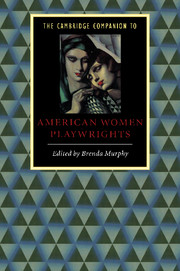Book contents
5 - The expressionist moment
Sophie Treadwell
from Part 2 - Inheritors
Published online by Cambridge University Press: 28 May 2006
Summary
Until recently, most standard accounts of twentieth-century American theatre have virtually ignored Sophie Treadwell. At most, Treadwell’s bestknown play, the explosive 1928 drama Machinal, receives mention as a last gasp example of 1920s expressionism on the commercial Broadway stage. With a renewed attention to Machinal, however, first with its reappearance in print in an anthology in 1981 and then in prominent revivals by the New York Shakespeare Festival in 1990 and the Royal National Theatre in London in 1993, Treadwell has begun to attract more scholarly and artistic interest. With her theatre career spanning six decades, including the writing of forty plays in a variety of styles and subjects, as well as acting in, directing, and producing her own works for the Broadway stage, Treadwell may be viewed as one of America’s pioneering, early twentieth-century women dramatists. Her writings consistently examine the conditions of modern society which inhibit women’s personal struggles for independence and equality. Especially in her most experimental works, Machinal and For Saxophone, Treadwell may also be seen as one of the first American women playwrights to utilize non-realistic innovations in style and narrative to create a decidedly feminist aesthetic in the theatre.
Sophie Treadwell was born in Stockton, California in 1885. Her mother, Nettie Fairchild Treadwell, was part of a ranching family which helped settle the Stockton area. Her father, Alfred B. Treadwell, was of Mexican and European descent. His desertion of the family in favor of a career as a lawyer and elected judge in San Francisco severely disrupted Sophie’s formative years. Despite the fact that she would often spend summers in San Francisco with her father, Sophie frequently experienced embarrassment and humiliation over her mother’s persistent attempts to follow and reunite with Alfred.
- Type
- Chapter
- Information
- The Cambridge Companion to American Women Playwrights , pp. 66 - 81Publisher: Cambridge University PressPrint publication year: 1999
- 2
- Cited by



